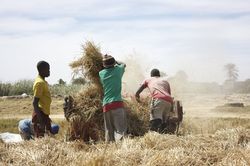AP | 10 February 2011
By Martin Vogl
BAMAKO, Mali (AP) - An opposition party in Mali wrote to the country's president demanding that details of contracts leasing out massive areas of agricultural land be made public.
In the letter shared with The Associated Press Wednesday, the Party for National Renaissance said that since 2003 almost 2 million acres of farm land have been leased out in secret contracts to Chinese, Libyan and South African firms.
The party's complaint comes at the same time that the United Nations' Food and Agriculture Organization and the World Bank have been voicing increased concern about land grabs in developing countries, including Mali.
Bakary Kante, an adviser to the Malian prime minister on agricultural issues, said the government has been promoting private investment because multinationals can afford to finance much-needed infrastructure for the country.
The area concerned contains some of Mali's most fertile land located around the inland delta of the Niger River with good access to water thanks to a dam. Despite this, only a small fraction of the land has been linked up to proper irrigation to this day.
"There's a huge potential there, but the Malian state does not have the finances to pay for the irrigation infrastructure," Kante said. "The proof — we've only managed to irrigate about 250,000 acres (100,000 hectares) since the dam was built, and that was 60 years ago."
Opposition party head Tiebile Drame said they plan to deliver the letter Saturday to Malian President Amadou Toumani Toure at a ceremony marking the beginning of work on land leased to the West African Economic and Monetary Union.
"Hundreds of Malian families have already been moved from their lands and villages because of these deals," said Drame. "From what we have seen, we have the impression that hundreds of thousands of hectares of Malian land have been given away almost for free."
Libyan state-owned company Malibya, which has 250,000 acres, is among the parties that leased large sections of land. The South African firm Illovo Group has 34,000 acres, and a Chinese backed project, N'Sukula, has been granted 32,000 acres. Malian companies have also been granted large holdings, including the firm Huicoma which reportedly has a deal for 250,000 acres.
Malibya has already financed the construction of a new irrigation canal and a tarmacked road. Local farmers, however, complain that they were not properly compensated for land acquired to build the canal and that it is now more difficult to move their cattle around the area.
Farmers' groups and international organizations have also been voicing increasing concern over the last few years about land grabs in developing countries. Oxfam, the International Institute for Environment and Development, the U.N.'s Food and Agriculture Organization and the World Bank have all produced reports on the issue recently.
The U.N. has come up with a set of principles to guide investments such as these, including respecting land rights, ensuring food security and ensuring transparency.
"There's been a lot of secrecy around these contracts," said Faliry Boly, a rice farmer in the region and the head of the farmers union in the affected area.
"We are giving our land away. Farmers who work their own land might one day become farm laborers for these big multinationals," he said. "We here in Africa were colonized once, we would be stupid to let it happen again."












